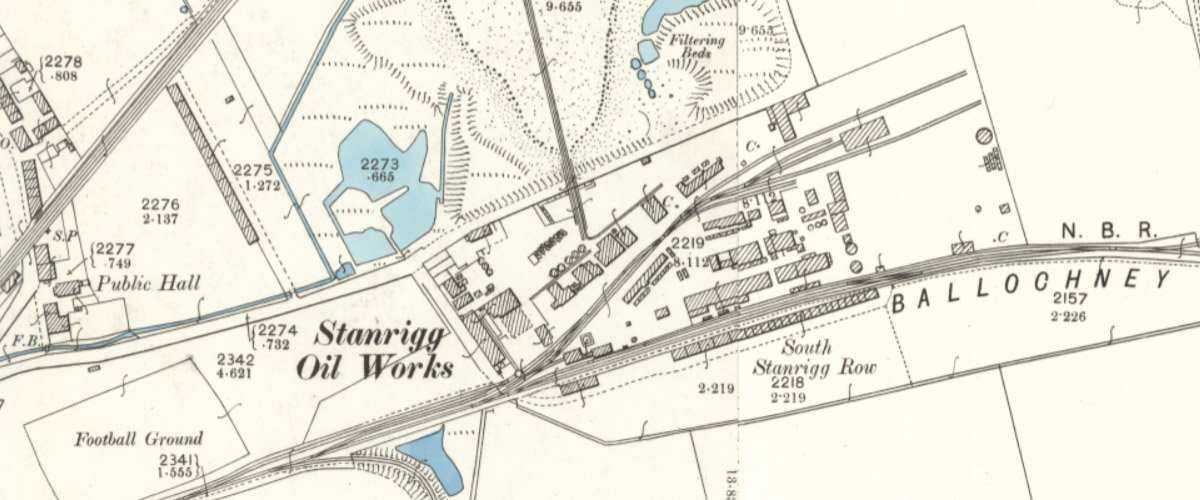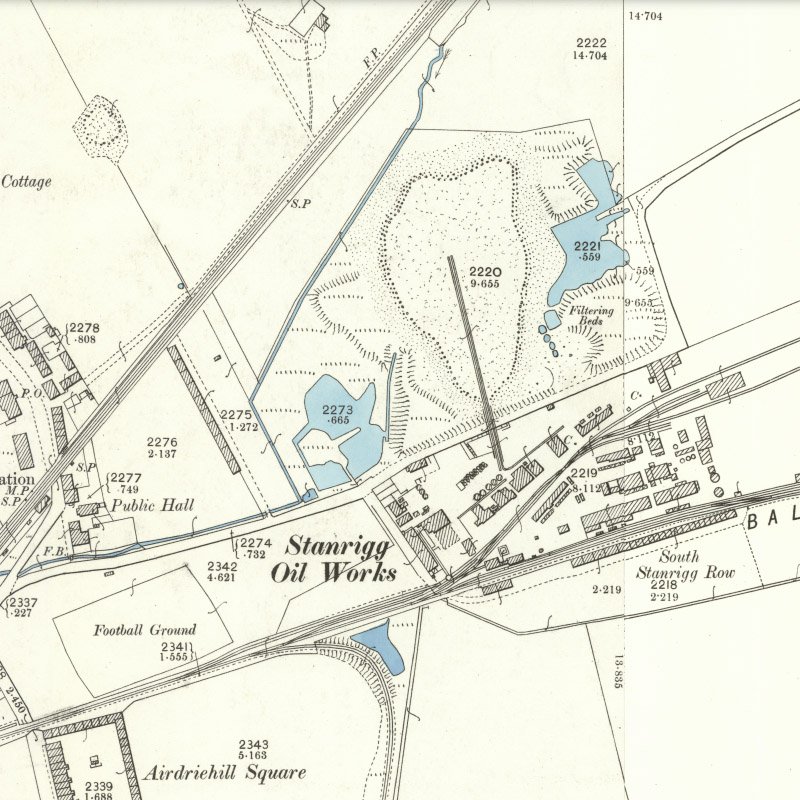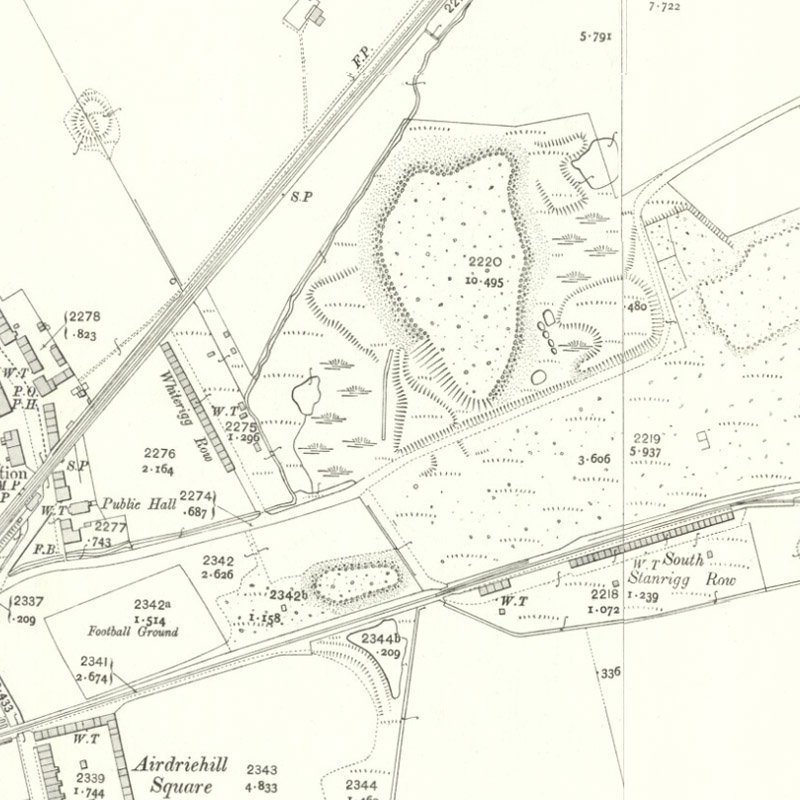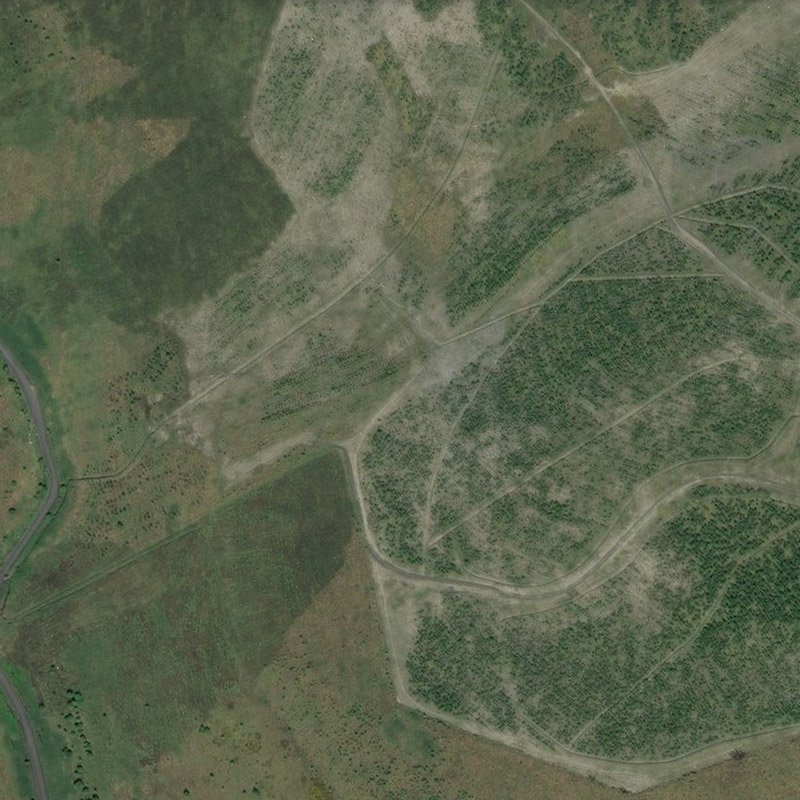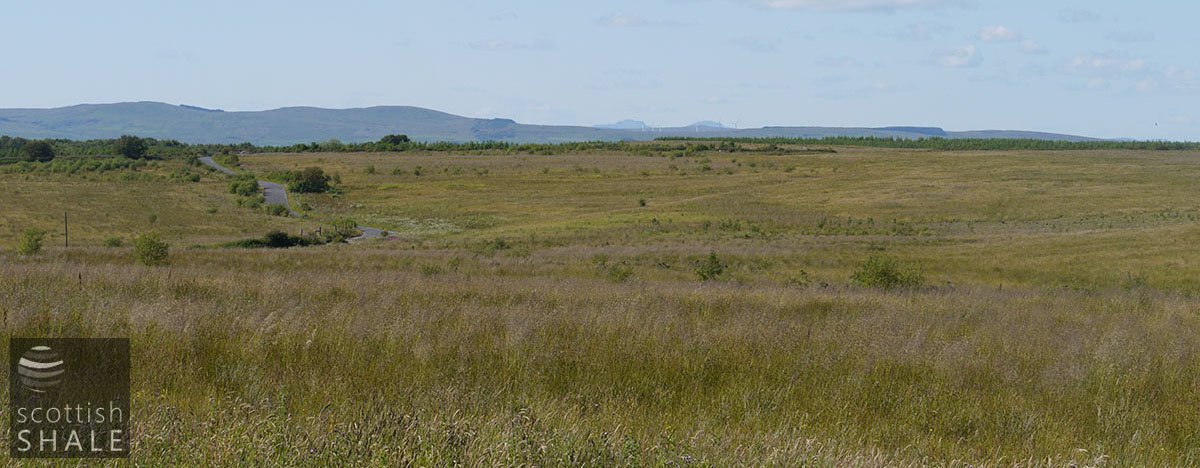- Aberdeen Oil Works
- Addiewell Oil Works
- Almondhill Oil Works
- Annick Lodge Oil Works
- Arden Oil Works
- Armadale Oil Works
- Auchenheath Oil Works
- Avonhead Oil Works
- Balgray Oil Works
- Ballat Oil Works
- Bathgate Oil Works
- Bathville Oil Works
- Bellsdyke Oil Works
- Bellsquarry Oil Works
- Benhar Oil Works
- Binnend Oil Works
- Birkenshaw Oil Works
- Bishop Street Oil Works
- Blackburn Oil Works
- Blackstone Oil Works
- Blackstoun Oil Works
- Blochairn Oil Works
- Boghall Oil Works
- Bredisholm Oil Works
- Breich Oil Works
- British Asphalte Oil Works
- Broxburn Oil Works
- Broxburn - Bell's Stewartfield Oil Works
- Broxburn - Albyn Oil Works
- Broxburn - East Mains Oil Works
- Broxburn - Greendykes Oil Works
- Broxburn - Hallfarm Oil Works
- Broxburn - Hutchinson's Oil Works
- Broxburn - Poynter's Oil Works
- Broxburn - Steele's Oil Works
- Broxburn - Steele's Stewartfield Oil Works
- Buckside Oil Works
- Burngrange Oil Works
- Calderbank Oil Works
- Canalbank Oil Works
- Champfleurie Oil Works
- Clippens Oil Works
- Cobbinshaw North Oil Works
- Cobbinshaw South Oil Works
- Coneypark Oil Works
- Craigie Oil Works
- Crown Point Oil Works
- Dalmeny Oil Works
- Deans Oil Works
- Doura Oil Works
- Drumbow Oil Works
- Drumcross Oil Works
- Drumgray Oil Works
- Dryflat Oil Works
- East Fulton Oil Works
- East Hermand Oil Works
- Eldin Oil Works
- Falkirk Oil Works
- Fergushill Oil Works
- Forthbank Oil Works
- Forth & Clyde Oil Works
- Gavieside Oil Works
- Grange Oil Works
- Grangepans Oil Works
- Greengairs Oil Works
- Hareshaw Oil Works
- Hartwood Oil Works
- Hawick Oil Works
- Hermand Oil Works (1866)
- Hermand Oil Works (1883)
- Holmes Oil Works
- Hopetoun Oil Works
- Hurlford Oil Works
- Inkerman Oil Works
- Inverkeithing Oil Works
- Kilrenny Oil Works
- Kilwinning Oil Works
- Kirkmuirhill Oil Works
- Kirkwood Oil Works
- Lanark Oil Works
- Lanemark Oil Works
- Levenseat Oil Works
- Limerigg Oil Works
- Linwood Oil Works
- Loanhead Oil Works
- Lochburn Road Oil Works
- Lochgelly Oil Works
- Longrigg Oil Works
- Magdalene Oil Works
- Methil Oil Works
- Millburn Oil Works
- Nettlehole Oil Works
- Niddry Castle Oil Works
- Nitshill Oil Works
- Oakbank Oil Works
- Palacecraig Oil Works
- Pathhead Oil Works
- Patterton Oil Works
- Pentland Oil Works
- Philpstoun Oil Works
- Port Dundas Oil Works
- Possil Oil Works
- Pumpherston Oil Works
- Raebog Oil Works
- Riggend Oil Works
- Rochsoles Oil Works
- Rochsolloch Oil Works
- Roman Camp - Almondfield Oil Works
- Roman Camp - Cawburn Oil Works
- Roman Camp Oil Works (1892)
- Roman Camp - Shale Oil Works
- Rosebank Oil Works
- Roughcraig Oil Works
- Rumford Street Oil Works
- Seafield Oil Works
- Shawsburn Oil Works
- Sheepford Locks Oil Works
- Shettleston Oil Works
- Shotts Oil Works
- Stand Oil Works
- Stanrigg Oil Works
- Stonehouse Oil Works
- Straiton Oil Works
- St. Rollox Works
- Swinehill Oil Works
- Tarbrax Oil Works
- Uphall Oil Works
- Uphall - Railway Oil Works
- Uphall - Wyllie's Oil Works
- Vulcan Chemical Works
- Wardend Oil Works
- Wattston Oil Works
- Westfield & Capeldrae Oil Works
- Westwood Oil Works (1941)
- Westwood Oil Works (1866)
- Whitebog Oil Works
- Whitehill Oil Works (Lanarkshire)
- Whitehill Oil Works (Midlothian)
- Whiterigg Oil Works
- Woodhall Oil Works
Stanrigg Oil Works
The last and the largest of the coal-oil works, producing crude oil and refined products from local coals. Redwood (writing in 1897) notes that "Stanrigg Oil Works, operated by Black, were started in 1865 and are still going."
Oilshale of Lothians states "… among the latter was included about fifty Stanrigg retorts, remarkable for their simple construction and large throughput (as much as 12 tons a day) used on the Musselband of the coalfields and Lilles shale in Renfrewshire."
| Date | Rateable Value | Owner | Occupier | Notes |
|---|---|---|---|---|
| 1866 | £360 | William Black | William Black | |
| 1867 | £240 | William Black | William Black | Name change to Meadowfield |
| 1868 | £240 | William Black | William Black | Name change to Stanrigg |
| 1869 | £340 | Stanrigg Oil Company | Stanrigg Oil Company | Partners: John, William, Gavin Black and Thomas Jeffrey |
| 1870 | £480 | Stanrigg Oil Company | Stanrigg Oil Company | |
| 1871 | £600 | Stanrigg Oil Company | Stanrigg Oil Company | |
| 1872 | £600 | Stanrigg Oil Company | Stanrigg Oil Company | |
| 1873 | £550 | Stanrigg Oil Company | Stanrigg Oil Company | |
| 1874 | £550 | Stanrigg Oil Company | Stanrigg Oil Company | |
| 1875 | £550 | Stanrigg Oil Company | Stanrigg Oil Company | |
| 1876 | £550 | Stanrigg Oil Company | Stanrigg Oil Company | |
| 1877 | £550 | Stanrigg Oil Company | Stanrigg Oil Company | |
| 1878 | £550 | Stanrigg Oil Company | Stanrigg Oil Company | |
| 1879 | £550 | Stanrigg Oil Company | Stanrigg Oil Company | |
| 1880 | £550 | Stanrigg Oil Company | Stanrigg Oil Company | |
| 1881 | £300 | Stanrigg Oil Company | Stanrigg Oil Company | |
| 1882 | £350 | Stanrigg Oil Company | Stanrigg Oil Company | |
| 1883 | £350 | Stanrigg Oil Company | Stanrigg Oil Company | |
| £100 | William Black & Sons | William Black & Sons | Minerals at Meadowhead | |
| £400 | William Black & Sons | William Black & Sons | Minerals at Arden | |
| 1884 | £400 | Stanrigg Oil Company | Stanrigg Oil Company | |
| 1885 | £400 | Stanrigg Oil Company | Stanrigg Oil Company | |
| 1886 | £400 | Stanrigg Oil Company | Stanrigg Oil Company | |
| 1887 | £400 | Stanrigg Oil Company | Stanrigg Oil Company | |
| 1888 | £400 | Stanrigg Oil Company | Stanrigg Oil Company | |
| 1889-96 | £400 | Stanrigg Oil Company | Stanrigg Oil Company | |
| 1897-1901 | £300 | Stanrigg Oil Company | Stanrigg Oil Company | + Coke Ovens |
| 1902 | £100 | William Black & Sons Ltd | William Black & Sons Ltd | |
| 1903 | £21.50 | William Black & Sons Ltd | William Black & Sons Ltd | Empty. In liquidation |
| NO FURTHER ENTRIES |
Recent images
FIRE AT AN OIL WORKS
About four o'clock yesterday morning (Tuesday) fire accidentally broke out in Whiterigg Oil Works, Whiterigg, belonging to William Black, Esq., coalmaster, there. The fire originated in one of the retorts, and speedily communicated with the stock of manufactured oil, the most of which was barrelled. Out of 21 retorts, 16 were partially destroyed, and 2000 gallons of oil consumed in the conflagration. The fire lasted for about four hours, and through the activity of William Black jun., and a number of workmen, Captain Clark, and some constables, a considerable quantity of barrelled oil was secured. The loss is estimated at about £300.
Glasgow Herald, 15th November 1865
.......
The demand for oil is increasing and the Airdrie Oil Works, which have been standing for some time, have again resumed operations. The Stanrigg Oil Company, through the active superintendence of Mr Jeffrey, an now produce an oil of greatly superior quality to the best American and for which a higher price is now obtained.
Scotsman, 14th February 1870
.......
JOHNSTONE – EXTENSIVE LEASE OF MINERALS.
Messrs. William Black and Sons, of Stanrigg, Airdrie, have leased from Mr Spier about 400 acres of minerals on his estate at Blackstone, in the Johnstone Area. The minerals comprise ironstone, shale, and coal.
Glasgow Herald, 25th April 1872
.......
AIRDRIE-Fatal Result of an Accident.
Yesterday, Mr David Crann, plumber, died from the result of injuries sustained by him last week. He, along with one of his workmen, had been repairing some. pipes at Stanrigg Oil Works, when the pipe burst, and all the workmen were slightly burned about the face and neek. Their injuries were considered very slight; but Crann seems to have got some internal shock or injury.
Glasgow Herald; 20th October 1874
.......
Whiterigg, belonging to Messrs Black & Co., is a large village, consisting, for the most part, of new brick rows, and a large square, also new, called Airdriehill Square. These are excellent two-roomed houses, with 7 wash-houses and ashpits and closets behind. The rent is 2s a week. There is, however, an old row in Whiterigg, consisting of very inferior houses. There are no back windows, and the interiors are poor in the extreme, both as to accommodation and furniture. Everybody declares that they are not fit for human beings to stay in, and I quite agree with everybody. They are not decently habitable even for Irish human beings, the least tidy of the mining class, who seem to keep this row all to themselves. Pit water is used at Whiterigg.
Glasgow Herald, 9th March 1875
.......
ALARMING FIRE AT STANRIGG OILWORKS.
On Sunday afternoon a rather alarming fire broke out at Stanrigg Oilworks, the property of Messrs William Black & Sons. Some of the men had been engaged in running of a quantity of waste pitch tar, when, from some cause unexplainable, unless, as the manager suspects, by spontaneous combustion, it took fire, and the burning fluid speedily came in contact with two dwelling-houses immediately adjoining the works, and before assistance could be got they were burned to the ground, the whole of the furniture of the families who occupied the houses being likewise destroyed.
Although considerable alarm was at first felt, in case the fire might spread to the benzoline store, the admirable precautions taken by Mr Dunlop, who had a pit dug close by the spot where the pitch was being run oft, and into this pit, which is partly filled with water, the burning fluid found its way, and was speedily extinguished. The damage will not amount to more than £100; but something might be done for the two burned-out families.
Lanarkshire Upper Ward Examiner, 10th December 1887
.......
AIRDRIE "CREESH BEFORE THE FLOOD !
At a meeting of the Geological Society of Glasgow, Mr Robert Dunlop, of Stanrigg Oil Works, exhibited specimens of fossil paraffin from Airdrie, where it is rarely found. It appears to be a product of distillation from oilbearing strata at a time when they were exposed to heat from intrusive igneous rocks. A miner's opinion of it was pithily expressed when he said he thought " it was some of the creesh left about the time of the Flood."
Lanarkshire Upper Ward Examiner; 20th April 1889
.......
AIRDRIE NATURALISTS' SOCIETY
…..Mr ROBERT DUNLOP pointed out that at Stanrigg, oil or petroleum was got for a long time, and was utilised in the miners' lamps and in lubricating the machinery. Mr ROBERT PATTERSON also spoke on the mineral paraffins of the district. Mr ROBERT M'LAREN exhibited some characteristic Meiotic fossil ferns—Sphenopteris affinis of the lower carboniferous formation. These ferns are from the lowest shales worked. The, were very much altered. the carbon of the frons been replaced by sulpfide of iron. They are never found above the camps shale.
Airdrie & Coatbridge Advertiser, 28th February 1891
.......
FIRE AT THE OIL WORKS
A fire took place at Stanrigg Oil Works on Thursday. It appears that workmen were at the time engaged taking down a dry retort, and one of their number who was cleaning some of the plates, set some tar on fire. The manager. however. at once took steps to have the fire extinguished and his efforts were successful, as the workmen soon managed to put it under. Airdrie Fire Brigade had been phoned for, but when it was seen that their services would not be required, a message was again sent to Airdrie to stop them. They were, however, by this time, well on their way. If the fire had not been so promptly put out, serious consequences might have been the result, as there are a lot of oil, tanks, etc, lying around. The damage done was not great.
Airdrie & Coatbridge Advertiser, 28th February 1903
.......
In the Motherwell area a thin parrot shale occurs as a roof to the Virtuewell Coal and was formerly used in the distillation of oil. The old Stanrigg Oil Works between Airdrie and Longriggend were set up to treat this shale.
Memoirs of the Geological Survey in Scotland Vol XXIV Cannel Coals, Lignite and Mineral Oil in Scotland by W. Gibson, 1922
- LVSAV1990.080 - Glass Plate Negative - Sections of Retort Bench - Glass plate negative of technical drawings of a retort bench, scale 3/8" to 1 foot.


